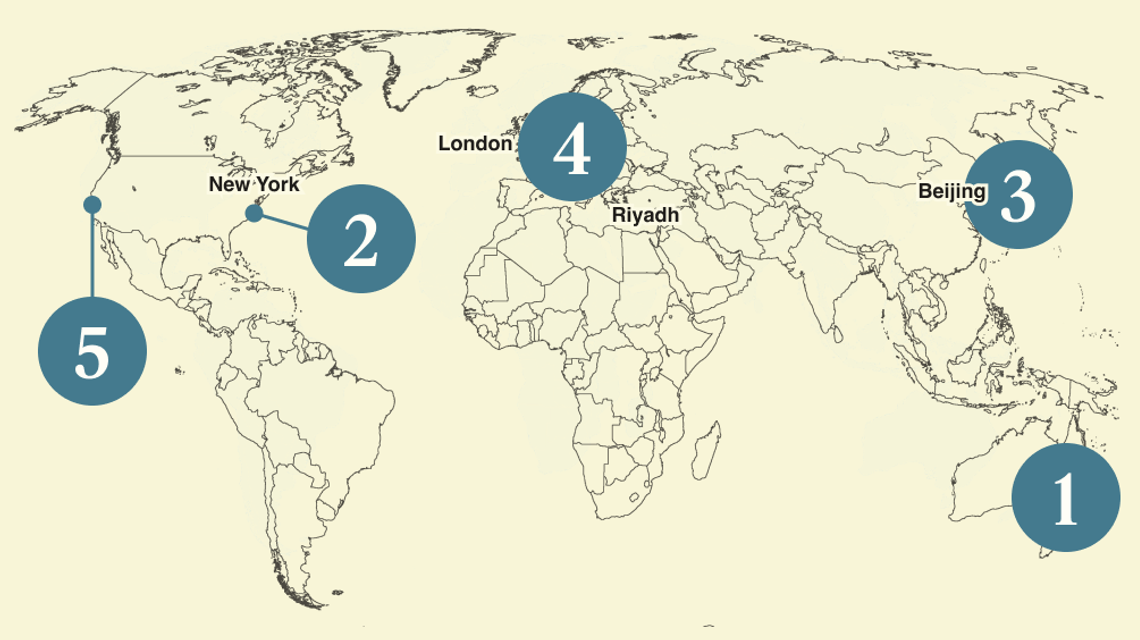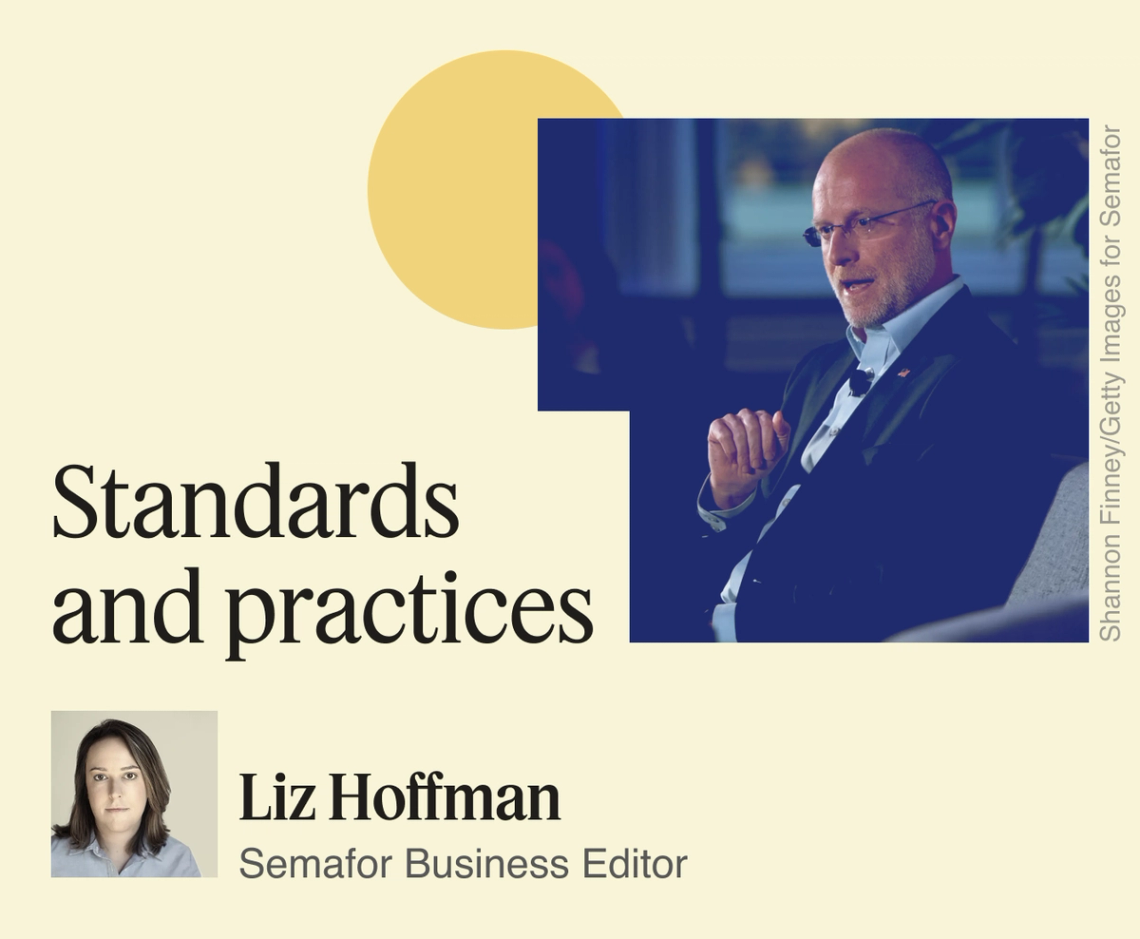| | In this edition, the free-speech battleground expands beyond media companies, and M&A deals among al͏ ͏ ͏ ͏ ͏ ͏ |
| |  | Business |  |
| |
|
 - The alts giant that could’ve been
- Fed consensus breaks down
- US, China tensions escalate
- Exxon CEO ‘pessimistic’ on trade talks
- Intel’s latest lifeline
 Anthropic is annoying the FBI by holding the line on Big Brother |
|
 ABC’s abrupt decision to pull Jimmy Kimmel off the air makes CBS’s retirement of its own late night show look a touch more like the financial decision the network said it was and less like the knuckling-under many assumed. There were no such pretenses from Disney, which owns ABC — just a swift capitulation after two companies owning roughly 70 affiliate channels threatened to go dark. One of them, Nexstar, needs approvals for its pending $6.2 billion takeover of Tegna from the Federal Communications Commission, whose chairman, Brendan Carr, went on a conservative podcast to criticize Kimmel’s comments about Charlie Kirk. This is the same regulator who wrote in 2021 that “a newsroom’s decision about what stories to cover and how to frame them should be beyond the reach of any government official.” The free-speech battleground is mushrooming beyond media companies and late night shows hemorrhaging viewers. Unverified videos of Starbucks employees declining to write Kirk’s name on customers’ cups have been making the rounds on TikTok, angering conservatives paying tribute — and catching the eye of right-wing boardroom rabble-rouser James Fishback, who gave me a call yesterday to vent and hinted at a public pressure campaign. Attorney General Pam Bondi is investigating an Office Depot store in Michigan that declined to print flyers for a vigil honoring Kirk. MSNBC, whose entire business model rests on resistance to President Donald Trump, quickly fired an analyst for commentary deemed too provocative. The Supreme Court’s 2014 Hobby Lobby decision protected privately held companies’ right to religious policies. But the conflicts quickly piling up have ensnared publicly traded corporations and a murkier, faster-moving debate about free speech rather than faith. I doubt Starbucks will go to the mat for a few baristas. But the central question of this political moment — and how responsible are companies for the views of their front-line employees — is heading for boardrooms across America. |
|
Talks for big alts merger fizzle |
 Jeenah Moon/Reuters Jeenah Moon/ReutersAustralia’s Macquarie Group held talks to acquire Carlyle, a deal that would have created a new member of the $1 trillion asset-manager club, Semafor scooped. The two firms discussed a transaction that would have instantly leapfrogged private-capital firms including KKR and Ares in size. Talks fizzled this summer as CEO Harvey Schwartz’s turnaround plan caught on with investors and Carlyle shares soared, people familiar with the matter said. The alternative asset-management world has braced for a wave of tie-ups as size and global reach have come to matter at least as much as dealmaking skill. With more than 18,000 private funds on the road seeking a collective $3.3 trillion, there’s $1 available for every $3 being sought, Bain & Co. found in June — a ratio that has tripled since 2021. Better performance matters, but the race is increasingly one for reach, resonance, and distribution. — Semafor contributor Gillian Tan and Liz Hoffman |
|
The great rate debate is here |
The Federal Reserve cut interest rates as expected Wednesday, but that’s where the clarity ends. Fed officials’ own (anonymized) forecasts show a near-complete breakdown of the consensus that Chair Jerome Powell has worked hard to hold together against escalating White House pressure and economic diagnoses that demand competing cures. “This is wild,” Navy Federal economist Heather Long wrote of the “dot plot” that shows where Fed officials think rates should be at the end of the year and onward. A third of officials want to hold steady, half of them want two cuts of 0.25 percentage points, two want one such cut, and one (presumably Trump’s newest appointee, Stephen Miran) wants the equivalent of five. One official wants to raise rates from here — a move that would spook the markets by signaling deep concerns about an economic slowdown. This is what consensus breakdown looks like:  |
|
China cuts off access to US chips |
 Gonzalo Fuentes/Reuters Gonzalo Fuentes/ReutersThe tit-for-tat between China and the US is escalating. Beijing on Wednesday banned domestic tech companies from acquiring a ubiquitous Nvidia chip, urging them to use homegrown processors, the Financial Times reported. The maneuver came days after the country opened an antitrust probe into Nvidia’s acquisition of an Israeli tech company in 2020. “I’m disappointed with what I see,” Nvidia CEO Jensen Huang told reporters. “But they have larger agendas to work out, between China and the US, and I’m understanding of that.” There are signs of détente on both sides, though, ahead of a planned Friday call between Xi Jinping and Trump. Chinese officials released a senior Wells Fargo banker who was barred this summer from leaving the country, and Trump appears to have conceded a key national-security point by blessing a TikTok deal that would keep control of the app’s algorithm in Chinese hands. |
|
Exxon CEO doubts Trump’s anti-ESG sway abroad |
 Brendan McDermid/Reuters Brendan McDermid/ReutersExxonMobil’s CEO told Semafor he was “pessimistic” that the Trump administration could pressure European regulators to roll back climate regulations. Darren Woods said he’s taken his complaints directly to the president about EU environmental disclosure regulations that he views as trade-crushing overreach, and which were on the table when Energy Secretary Chris Wright met with European officials last week. “Europe is slowly suffocating itself,” Woods told Semafor’s Tim McDonnell. “They’re trying to build a so-called green economy, that’s not working. And
instead of trying to fix that, they’re now trying to drag every American company down.” The Trump administration and US energy companies might be ready to dump the climate momentum of the past several years. But Europe isn’t, in part because big European investors still care a lot about ESG. |
|
Nvidia props up rival Intel |
 Dado Ruvic/Illustration/Reuters Dado Ruvic/Illustration/ReutersNvidia will invest $5 billion in Intel and co-develop chips for data centers and personal computers, a vote of confidence from a competitor following the Trump administration’s lifeline to the struggling tech giant. Roughly $16 billion has been poured into the company, first by the US government, then by SoftBank, and now by rival Nvidia.“This has been a golden few weeks for Intel after years of pain and frustration for investors,” one analyst wrote. Talks between Nvidia and Intel began before Trump attacked CEO Lip-Bu Tan in August, a person familiar with the matter said. Notably, the deal does not mean Nvidia will become an Intel Foundry customer — yet. |
|
 Dr. Tedros Adhanom Ghebreyesus, Director-General, World Health Organization, will join the stage at The Next 3 Billion — the premier US summit focused on closing the global digital divide. Semafor editors will sit down with global executives and thought leaders to highlight the economic, social, and global impact of bringing the next 3 billion people online. Sept. 24, 2025 | New York City | Delegate Application → |
|
➚ BUY: Banana splits. The resignation of a Ben and Jerry’s co-founder leaves Unilever’s ice-cream spinoff with one less headache inside the tent. (“We disagree with his perspective and… remain committed to Ben & Jerry’s unique three-part mission,” the company said.) ➘ SELL: Half Baked. StubHub shares slumped on their first day of trading, the first of the latest crop of IPOs to drop right out of the gate. |
|
 Companies & Deals- Demo-lition: Meta’s live test of its new smart glasses glitched out twice, leaving Mark Zuckerberg awkwardly blaming the Wi-Fi. Points for trying, though: Apple stopped live demos since going virtual during the pandemic, and Google learned its own lesson last year.
- Meta Platforms, Ink: Zuckerberg’s company has also reportedly been meeting with publishers including Axel Springer and WSJ owner News Corp. to discuss licensing their content to train its AI models, following a deal last year with Reuters. Competitors like OpenAI and Amazon also reached similar agreements as they try to ease tensions with media companies.
- Self-reflection: “Does anyone have strong negative feelings about Jeff Bezos?” is among the questions Amazon is asking jurors ahead of a federal antitrust trial starting next week that accuses the company of using byzantine “dark patterns” to keep users from canceling Prime. (Other questions suss out anti-capitalist bents.)
Watchdogs- Swiss miss: A hedge fund that owns 1.4% of UBS says the bank has “no other realistic option but to leave” Switzerland, forcing it to raise billions of dollars in capital. Is UBS chair Colm Kelleher sending an unsubtle message to Zurich?
- Down to business: Zohran Mamdani has been thinking more about how he would actually run New York City and less about running to run New York City, meeting with business leaders and getting advice from Barack Obama to prioritize smart hires, CNN reported.
Markets- An economy in (f)lux: “Being in the luxury tier definitely protects, to a point,” José Andrés Group Global’s CEO said at a Semafor event last night. Tariffs are crimping luxury margins and mucking up supply chains, but high-end consumers still crave an edge. Moody’s confirmed the sentiment this week: The top 10% of earners accounted for nearly half of total spending, the highest level on record.
- Good Old Bailey: The Bank of England held interest rates at 4%, with Gov. Andrew Bailey saying the UK is “not out of the woods yet” on inflation.
|
|
|